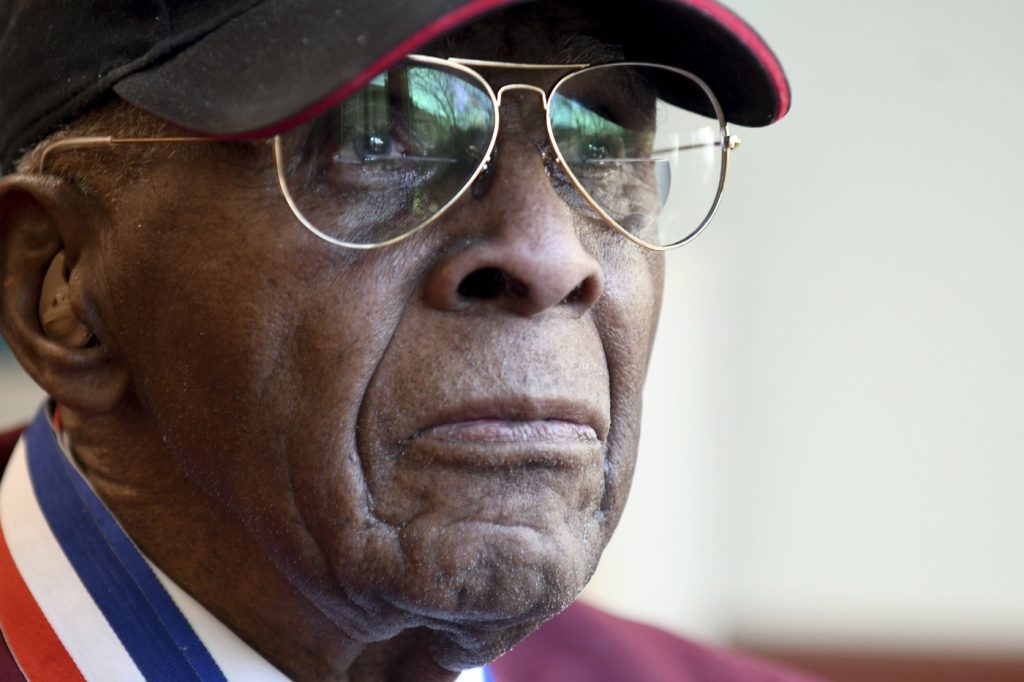AURORA, Colo. (AP) — As the members of the groundbreaking Black Air Force unit, the Tuskegee Airmen, continue to pass away due to advanced age, there are concerted efforts to honor and preserve their legacy. This task has been complicated by controversial directives from former President Donald Trump, who aimed to eliminate various federal diversity, equity, and inclusion programs. Col. James H. Harvey III, age 101, is one of the last surviving members of this pioneering group, which was established during World War II, showing that Black pilots and support personnel could match their white counterparts in combat effectiveness.
Col. Harvey distinguished himself as the first Black jet fighter pilot to fly in Korean airspace during the Korean War, completing an impressive 126 missions. He was part of the four-member Tuskegee Airmen team that won the first U.S. Air Force Gunnery Meet in 1949, a precursor to the contemporary Navy's Top Gun School. Reflecting on the prejudice they faced, Harvey stated, "They said we didn't have any ability to operate aircraft or heavy machinery. We were inferior to the white man. We were nothing. So we showed them."
After Trump's inauguration in January 2017, the Air Force made the contentious decision to eliminate training materials featuring videos of the Tuskegee Airmen, which sparked bipartisan outrage, as well as discontent from the White House. Defense Secretary Pete Hegseth labeled this act as a "malicious implementation" of Trump’s executive order that affected DEI initiatives. Following the backlash, the Air Force reinstated the educational content.
During the announcement of their reversal, Air Force Chief of Staff Gen. David Allvin indicated that the initial removal was hasty, as the Air Force was compelled to comply with the executive order "with no equivocation, no slow-rolling, no foot-dragging." The videos, which were part of training courses for new recruits, provided insights into the history and accomplishments of the Tuskegee Airmen. Additionally, many images associated with them were flagged for removal from a Pentagon database.
Col. Harvey criticized the situation, expressing disillusionment regarding progress in racial equality. He directly attributed part of the growing prejudice in America to Trump's influence, stating, "I'll tell him to his face. No problem. I'll tell him, 'You're a racist,' and see what he has to say about that." Harvey believes such sentiments contribute to ongoing societal challenges.
The Tuskegee Airmen unit was originally formed in 1941 as the 99th Pursuit Squadron at the Tuskegee Institute in Alabama, later becoming the 332nd Fighter Group. By the end of World War II, the unit had destroyed or damaged over 400 enemy aircraft in various theaters, including North Africa and Europe, and even sank a German destroyer. Among the 992 pilots trained from 1942 onward, 335 were deployed, with 66 killed in action and 32 taken as war prisoners.
The U.S. Air Force integrated Black and white personnel in 1949, which resulted in the Tuskegee Airmen being absorbed into other units. It wasn't until almost half a century later that the Air Force acknowledged the 332nd's achievements during the gunnery meet at what is now Nellis Air Force Base. Initially, the names of the winners were listed as "unknown," and the trophy awarded to them went missing for many years.
Col. Harvey, who trained in World War II but did not see combat until Korea, flew the F-80 Shooting Star and earned numerous decorations, including the Distinguished Flying Cross. After retiring as a lieutenant colonel in 1965, he received an honorary promotion to colonel in 2023. In a noteworthy instance, Trump promoted another prominent Tuskegee Airman, Charles McGee, to brigadier general in 2020. McGee passed away in 2022 at the age of 102.
For Harvey, the Air Force Gunnery Meet remains his most significant achievement, which finally received recognition in 1993. The missing trophy was also eventually discovered in a museum storeroom. "We were good, and they couldn't take it away from us," said Harvey. "We were good. And I’ll repeat it until I die."










